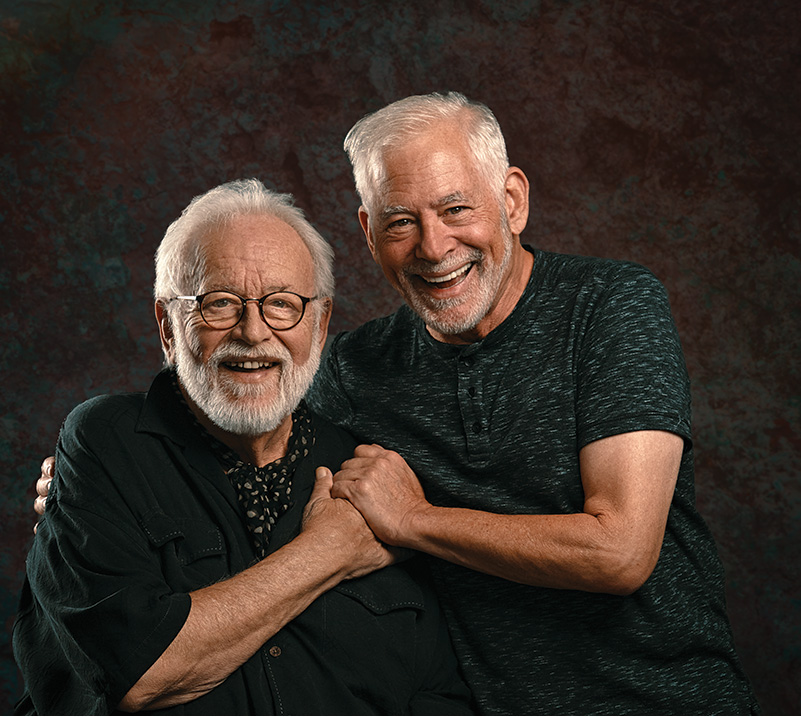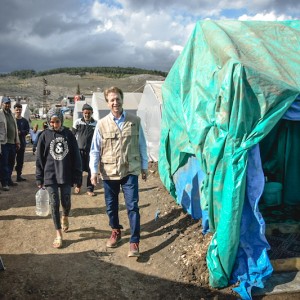For audiences at Asolo Repertory Theatre, the names Peter Amster and Frank Galati appear on the yearly playbill like old friends in town for the holidays. Partners in life and their love of the stage, the pair have directed a show each at the Asolo near every year since 2011. (The Tony Award-winning Galati skipped 2013, but directed two shows in 2011; Amster skipped 2013 as well, but did double-duty in 2012.) And whether updating Russian canon with A Doll’s House Part 2 or saluting French avant-garde absurdism with Rhinoceros, skewering political corruption in Born Yesterday or celebrating the country’s founding in 1776, bringing classics like 12 Angry Men to the stage or championing new fare like Morning After Grace, the two have left their stamp on season after season of Asolo theater. This year looks to be no different, as Amster kicks off 2020 with a staging of Agatha Christie’s Murder on the Orient Express, and Galati reunites the Tony Award-winning trio behind his 1998 smash production of Ragtime for the April world premiere of Knoxville, a new musical drama adapted by Galati from James Agee’s Pulitzer Prize-winning novel A Death In the Family. As the two gear up for their respective opening nights, SRQ Publisher Wes Roberts grabs a seat backstage to talk the pitfalls in polemics, the immortal power of the whodunit and which poet it was who declared death the mother of beauty.
SRQ: Why do you think Sarasota has such a rich artistic community? Peter: That’s a trick question. Frank: That’s a hard question. Peter: It just has to be that the people who came here brought with them that desire for culture. They had come from cultured places, whether it was New York or Chicago or wherever, and they decided that this was going to be the place where it was going to happen. The Asolo as been here since the ’60s and that spirit spread to the symphony, the ppera, the ballet and four or five equity theaters. Whatever seed was planted, it germinated, and it brought more people who saw this as a cultural mecca. Frank: I think it’s also a result of the stew produced by a small group of very wealthy arts patrons and led by Mabel Ringling and the other dowagers and matriarchs of Sarasota. [For example, local community assets] like Selby gardens are an expression of the commitment of Mrs. Selby. We see the echoes of John Ringling’s interest in art and architecture. I don’t know how but there was a magnetic energy produced. The next thing you know, you have the Sarasota School of Architecture and back in the 50s, the burgeoning, contemporary art movement. These threads…it’s magic.
And that magnetism pulled you two here? Peter: We were living in Miami, Coconut Grove, and it was a challenge for us because there’s no theater there, like one or two small places. Frank: This is an amazing town. I first came in the 60s. I was a teacher and my first gig was at the University of South Florida in Tampa. So I had pals and we would pile in the car and drive here and go to the theater, which had a fine reputation even in 1968. The work was really good. I saw two Shakespeare history plays that were really brilliantly done. So I had it in the back of my mind and when we decided I was retiring, Peter and I thought, “Well, we’ll spend some winters south,” and one thing led to another.
Where do your threads begin? Peter: Oh, I started in New York. I lived in Long Island until I went to Northwestern and when I was in my senior year that is when I met him. We moved out of the East Coast, and the East Coast sensibility, to Chicago. I think about Sarasota versus the east coast of Florida also. I mean, it seems to be that [Florida’s east coast was] developed by real estate people and bankers and money, money, money, money, money people. And this part of Florida seems to have had a sense of adventure that’s missing on the other coast and a little more relaxed society.
And you, Frank? Frank: Oh, what about me? Well, I’m from Chicago. I had no intention of working in the theater, but I became more and more practiced through high school shows. I got a scholarship. It was a powerful time. It was 1969. The war in Vietnam was intensely heated up. There were many young people my age and fellow university students who did literally leave the country. They went to Canada. We had a friend who basically starved himself until he was below the acceptable weight to be taken. And there was a tremendous amount of solidarity. You wanted life! Now! Today! [You wanted] to be an engine for change. So, anyway, I grew up in this. And I went to Northwestern. Northwestern was kind of a perfect fit for me as far as schools go. We had a great acting teacher who would say [to the acting students], “Are you taking geometry? Are you taking physics? Are you taking chemistry?” She believed that those courses were as important as literature and poetry if you were to be fully expressive on stage.
I think a lot about the importance of artists respecting the capacity of the audience to be challenged. There has been a lot of criticism recently that so much popular art seems to be giving a lecture—about issues, politics, whatever—at the cost of the story and characters. your thoughts? Peter: I do think it’s a pendulum that swings back and forth. In any theater it’s possible for the plays to cluster around issues. They become polemic. And the audience after a while will just get tired of it. They come to be enlightened and taken on a journey, not to be lectured to. You want stories that take you someplace and leave you different when they are over. It seems to me that that’s what theater does best.
I saw your staging of “Rhinoceros” at the Asolo Rep and I loved it. After I saw the play, I read either a local review, or someone’s online posting, and after I read it, I thought, “They got it all wrong! That’s not what the play was about!” But I know that that’s not true, what happened is that this other person took a different journey than I did. Is that something you tried to achieve? Frank: That’s a very nuanced response to the play. The play is sneaky and subversive in all kinds of ways. Ionesco posits a fable that is absolutely outrageous. And then he follows the consequences. You slip and slide because he doesn’t give you anything to really hold on to. In terms of argument and rhetoric, he is as appalled by the propaganda on the right as he is by the propaganda on left. And just when you think you’ve got his argument, uh, it, evanesces.
Let me ask you about your new plays for this season. Frank, this year you are premiering a new musical, “Knoxville,” that you’ve adapted from a novel. Tell us about the story. Frank: Well, the play is called Knoxville because it draws on the citizens of a midsize Southern town at the bend of a river that makes it a very attractive and appealing port for commerce of all kinds. It is about one family, a father, a mother and the boy who becomes the writer, James Agee, who is basically generating a memoir in this play. This is what happens as he recalls when he was 6 years old and there was a trauma in his life. It exposes the underbelly of a community and its tensions, its conflicts. They’re very small. But, of course, for our little lives, small is huge.
Why this story? Frank: By virtue of its ample details, this story is the evocation of another time, another place. It’s 1900, 1915, pre–World War I, just on the threshold, a sort of liminal in-between zone. It is so specific. It’s this mother, this father, this kid. It’s universal. I love the novel. I think the prose in page after page of this novel is on a par with almost any of our greatest American writers. And I would say, in particular, someone like Faulkner, because of the relish and precision and skill, the leap in any given sentence, is really almost breathtaking. There is this sentence, at the front, “We’re talking now of Knoxville, Tennessee, in the time that I lived there so successfully disguised to myself as a child.” Now that is one slithery sentence. There’s so much about the miracle of language that you really can’t fully absorb or appreciate or fathom until you’re speaking out loud. That sentence I just reviewed, it has a heartbeat in it. It’s a living thing. It has a point of view. But its purpose is not to persuade. Peter: It seems to me that one of the great things our jobs allow us to do is explore some of the most extraordinary works of literature, from the inside out. My seventh grade history teacher, Mrs. White, she was so ancient that [we joked that] she taught American history through personal experience. It stuck with me all these years, she said, “You can never be sure you know something until you tell it to somebody else.” And that is kind of what we do in rehearsal and in the theater; its the process of knowing by speaking, by uttering, by giving voice to the ideas. Language gives it a shape.
You’ve both discussed the story with so much gravitas and depth, and yet this is a musical. So the music is half of the experience. What does it sound like? Frank: Well, it sounds like a song book of tunes from Tennessee. It’s flavored with the wonderful rural music-making intuition that is about country music and the degree to which country music tends to be story after story after story after story and the wail, the passion, the anguish, the cry. You can hear that loneliness, that feeling of the way music generates momentum in a certain tonality, that’s, I think, what it feels like. Peter: I’ve listened to the score a lot and I love it. To me, Stephen Flaherty is one of the great composers of our time and Lynn, I think, is probably the greatest living lyricist. It’s not country music like Nashville contemporary music at all, but it’s more like parlor music from the turn of the century. It’s remembered songs from a different time couched in a savvy, contemporary Broadway sound.
Can’t wait to hear it. Peter, tell us about “Murder on the Orient Express.” It’s clearly a play that is nonstop fun, but it eventually asks big questions as well.
Peter: Let me say, getting an entire train on the stage, and then moving from sleeper car to dining car, and back again, it’s got potential for being a very exciting production. I’ve got a design team that is absolutely tops. And Ken Ludwig, who wrote the stage adaptation, certainly features the broad funny aspects of the telling of the story, but he left enough of what’s deep and important to give it some teeth, some depth and some dark areas. It really speaks to the fight between what is good and what is right. Christie herself said it was Hercule Poiroit’s biggest moral challenge. Once he solves the crime, he has to confront his own very rigid sense of moral truth and it somewhat shatters him. However, the play is hilarious. Christie isolates a whole bunch of very different people in a space together and we get to see how the different vagaries of human personality respond to that situation, and to each other.
This brings us back to earlier in our conversation. There are big themes happening onstage, but the journey is very personal and very human.
Peter: The wonderful thing is that all of these characters are acting, they’re pretending to be somebody else. And so there are layers of truth and layers of personality and revelations. They keep tearing their face off and there’s a different face underneath. It’s going to be a lot of fun. It’s going to be gorgeous to look at. But there’s enough in there to get the dark and the light going together. Frank: Can I ask a question? Michel Foucault [made an argument] that it was the obligation of the writer in constructing and projecting the fictional world to lead the reader to the precipice of knowing several times during the course of the story and yanking her away. Isn’t part of the fun the relationship that you have with the writer in this tug of war of trying to figure out “who done it?” Peter: We are learning about things through Hercule Poroit’s eyes. Only one time do we see something he does not. He’s very frustrated and it’s a frustrating journey in terms of trying to find out the truth. He’s coming to cul-de-sacs and dead ends and hallways to finally come up with the truth. We know Hercule Poroit with his “tiny gray cells,” so we know eventually we’re going to get there. But in this Agatha Christie work, he’s more bewildered than he is in any of the other stories. And when he finally does find out the truth, it’s everything that he can do to come up with a conclusion that is good as well as right.
Do you want people to walk away from the play and be changed? And in what way?
Peter: Oh, good question. I think one of the things I would love to happen is that they say, “I had no idea that Agatha Christie was so good. Let me go back and read the originals.” Her stories are great. She was amazing.
Frank, how about “Knoxville”? Will the audience be changed?
Frank: Well, I hope the audience, it’s such a cliché, but I hope they will find a pleasure and delight and comfort in this heartwarming, emotional, moving right of passage. Perhaps the most beautiful and tender and mysterious event in the novel, Knoxville, and hopefully in our production, is when little Rufus, who’s 6 years old, is led by his mother into the parlor to look at his father in the coffin. Who hasn’t or wouldn’t have had an experience of such a nature? Peter: Is it Keats who said, “Death is the mother of beauty”? Frank: [It was] Wallace Stevens. It is a poem that I’m very fond of. The line in the poem is “Death is the mother of beauty, mystical, within whose burning bosom we devise our earthly mothers waiting, sleeplessly.” It is a universal experience. Almost everyone becomes an orphan. I hope audiences will savor the author’s genius.










